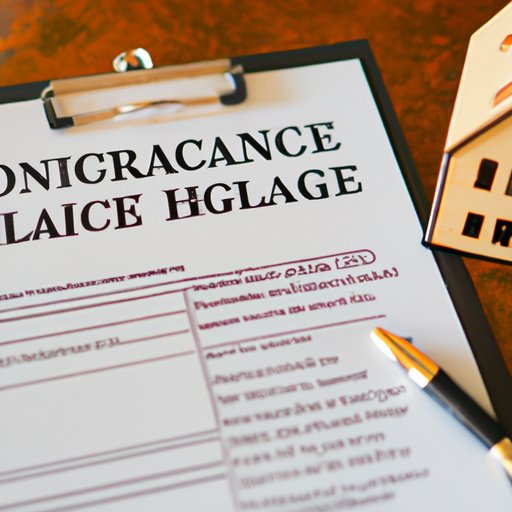Introduction
Home care for the elderly can be an expensive necessity, but many elderly individuals and their families may not be aware of the extent to which insurance may help cover these costs. In this article, we’ll explore the pros and cons of insurance coverage for home care for the elderly, examine different types of insurance plans that offer home care coverage, investigate regulations and laws surrounding home care insurance coverage and discuss how to choose the right home care insurance plan.
Analyzing the Pros and Cons of Insurance Coverage for Home Care for the Elderly
When considering whether or not to pursue insurance coverage for home care for the elderly, it’s important to weigh the pros and cons. Let’s take a closer look at both sides of the equation.
Benefits of Home Care Insurance
The primary benefit of home care insurance is that it can provide financial assistance in paying for expensive home care services. This can be especially beneficial for those who need long-term care, as the cost of such care can add up quickly. Additionally, some home care insurance plans may include additional benefits such as access to discounts on medical supplies, transportation and other services.
Drawbacks of Home Care Insurance
One potential drawback of home care insurance is that there may be restrictions on the types of services that are covered. For example, some plans may only cover certain types of home care services or may have limits on the amount of coverage available. Additionally, some plans may have high deductibles or co-pays, making them prohibitively expensive for some individuals.

Exploring Different Types of Insurance Plans that Offer Home Care Coverage
There are a number of different types of insurance plans that offer home care coverage. These include private insurance, government-sponsored insurance and supplement insurance.
Private Insurance
Private insurance is typically provided through employers and can cover a variety of health care services, including home care. These plans typically cover a wide range of services, from basic home care to more specialized services such as physical therapy. However, private insurance plans may have higher premiums than other types of insurance plans, so it’s important to compare different plans and determine which one best meets your needs.
Government-Sponsored Insurance
Government-sponsored insurance plans, such as Medicare and Medicaid, are available for those who qualify. These plans typically cover basic home care services and may also cover more specialized services in some cases. However, these plans usually have strict eligibility requirements and may not cover all the services you need.
Supplement Insurance
Supplement insurance plans are designed to provide additional coverage for those who already have a primary insurance plan. These plans typically cover a variety of home care services, including physical therapy and skilled nursing. However, they may have high deductibles and co-pays, so it’s important to carefully review the details of the plan before signing up.

Examining Regulations and Laws Surrounding Home Care Insurance Coverage
In addition to the different types of insurance plans that offer home care coverage, it’s important to be aware of the regulations and laws that govern home care insurance coverage. Let’s take a closer look at some of the most important ones.
Federal Laws
The federal government has enacted several laws that regulate home care insurance coverage. These include the Health Insurance Portability and Accountability Act (HIPAA), which protects the privacy of health care information; the Affordable Care Act (ACA), which provides subsidies for those who cannot afford private insurance; and the Consolidated Omnibus Budget Reconciliation Act (COBRA), which allows individuals to keep their health insurance coverage if they lose their job.
State Laws
In addition to federal laws, each state has its own set of laws governing home care insurance coverage. These laws vary from state to state, so it’s important to research the specific laws in your state. Additionally, some states may have additional programs or subsidies available to help cover the cost of home care services.

Investigating How to Choose the Right Home Care Insurance Plan
Choosing the right home care insurance plan can be a daunting task, but there are a few key factors to consider that can make the process easier. Let’s take a look at some of the most important things to consider when selecting a home care insurance plan.
Consider Your Needs
It’s important to carefully assess your individual needs when selecting a home care insurance plan. Consider the type of care you need, the cost of the services, and any additional benefits that may be available. This will help you narrow down your options and find the plan that best meets your needs.
Compare Plans
Once you’ve identified your needs, it’s time to start comparing plans. Look at the coverage offered by each plan, the cost of the premiums, and any additional benefits or discounts available. Make sure to read the fine print and understand the terms and conditions of each plan before making a decision.
Review Costs
Finally, it’s important to review the costs associated with each plan. Pay close attention to the deductibles, co-pays, and other out-of-pocket costs. Make sure you understand what is and isn’t covered by each plan, and factor in these costs when calculating the total cost of the plan.
Investigating How to Make the Most of Home Care Insurance Coverage
Once you’ve chosen the right home care insurance plan, it’s important to make the most of your coverage. Here are some tips for doing so.
Understand Benefits
Make sure you understand the specifics of your plan and what services are covered. This will help you get the most out of your coverage and ensure that you’re taking full advantage of the benefits offered by your plan.
Utilize Resources
Many insurance companies offer resources to help you make the most of your coverage. Take advantage of these resources, such as online tools and customer service representatives, to make sure you’re getting the most out of your plan.
Take Advantage of Discounts
Many home care insurance plans offer discounts on medical supplies, transportation, and other services. Make sure to take advantage of these discounts whenever possible, as they can help reduce the overall cost of your plan.
Conclusion
Home care for the elderly can be an expensive necessity, but insurance can often help cover the costs. There are a variety of different types of insurance plans that offer home care coverage, including private insurance, government-sponsored insurance, and supplement insurance. It’s important to consider your needs, compare plans, review costs and understand the benefits of your plan in order to choose the right one. Additionally, utilizing resources and taking advantage of discounts can help make the most of your home care insurance coverage.
(Note: Is this article not meeting your expectations? Do you have knowledge or insights to share? Unlock new opportunities and expand your reach by joining our authors team. Click Registration to join us and share your expertise with our readers.)
